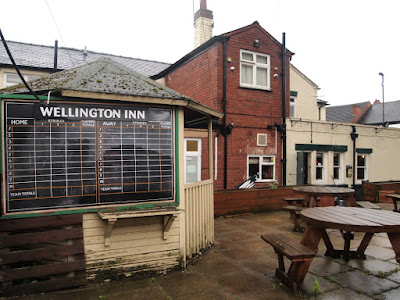Medals and Trophies for pub games such as Darts, Skittles, and even Quoits are fairly common, in fact I come across far more of them than I'd ever want to buy. Every now and then I come across something a bit rarer though, like this enamelled roundel which would have been mounted on a trophy for the game of Rings.
Rings is a game I've yet to encounter outside of one or two specialist pub collections, nor would I unless I travelled to the Isle of Wight, Essex, or Ireland where the game is at its most popular. The Ventnor & District is the last remaining of two leagues on the Isle of Wight, the Essex branch of the game represented by a single league at the Silver Hall Social Club so far as I can tell. The real stronghold of the game though is in Ireland, where there are numerous leagues and a Ring-Board Academy to oversee competition. The image on this roundel represents the 15-hook version of Rings played in and around Ventnor (the Essex and Irish boards have 13 hooks), the aim being to hook small rubber rings, scoring in the manner of a Darts game.
These are fairly typical Darts fob medals of the mid-late 20th century. The one above features a simple enamelled image of a Dartboard, the one below attractively embellished with a set of silver Darts. The above medal is made from a base metal rather than silver so there's no hallmark to date it. Unfortunately it carries no engraving on the back either, so there's no clue as to who it was awarded to, or for what competition. I've also failed, as yet, to discover which 'Works Social Club' in Nottingham this league operated from, but presumably it was a large one to sustain what appears to have been a significant in-house competition.

 By contrast, this hallmarked silver example by James Fenton of Birmingham, is a textbook example of what I hope to find on the back of all fob medals. The team from the Junction Arms, Upper Holloway in London were clearly the league winners of the St Dunstans Darts League in 1950. This was a London based league that had a strong association with the St Dunstans War Veterans charity. Touring exhibition matches by the famous St Dunstans Four helped fund the leagues charitable work, and a successor to this league continues today in the form of the Salisbury & District Darts League which supports the charity Wiltshire Sight. The Junction Arms is also still going strong, though under the name of the Oak & Pastor these days.
By contrast, this hallmarked silver example by James Fenton of Birmingham, is a textbook example of what I hope to find on the back of all fob medals. The team from the Junction Arms, Upper Holloway in London were clearly the league winners of the St Dunstans Darts League in 1950. This was a London based league that had a strong association with the St Dunstans War Veterans charity. Touring exhibition matches by the famous St Dunstans Four helped fund the leagues charitable work, and a successor to this league continues today in the form of the Salisbury & District Darts League which supports the charity Wiltshire Sight. The Junction Arms is also still going strong, though under the name of the Oak & Pastor these days.Quoits, as mentioned previously in this short series, was a hugely popular mens sport, played and spectated throughout the whole country at the time this medal was awarded in 1919. Perhaps hard to believe given that Quoits today has shrunk to a regional game that many people may never even have heard of let alone seen played, restricted as it is to just a handful of leagues in England, Scotland, and Wales. Needless to say, London isn't one of these regions, but it's an indication of just how widespread the game was at the time that there would have been separate associations managing the game for several different areas of the capital. This medal was made by JA Wylie & Co of Birmingham (and London), and was awarded to the League Championship Runner(s)-up.
























































